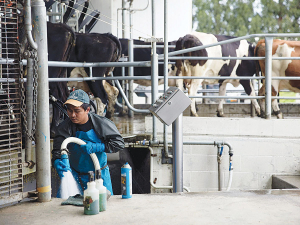Come and chat to the DairyNZ team
DairyNZ's team is looking forward to catching up with Southland and Otago dairy farmers at the Southern Field Days in Waimumu near Gore next month.
 DairyNZ says it has suggested the Government take up the option of on-farm self isolation for migrant farm workers amid a lack of MIQ spaces at the border.
DairyNZ says it has suggested the Government take up the option of on-farm self isolation for migrant farm workers amid a lack of MIQ spaces at the border.
DairyNZ says it has put a number of suggestions to the Government about how the sector could manage labour needs and health risks caused by the Covid-19 pandemic.
On-farm isolation is an option, says DairyNZ chief executive Tim Mackle.
"Farms are already away from communities, and farmers are used to maintaining good hygiene standards."
Alongside work to recruit international workers, DairyNZ has a range of initiatives underway to attract Kiwis into dairy, including GoDairy. A new campaign will also soon be launched to give Kiwis a better understanding of what it means to be a dairy farmer.
DairyNZ is also leading the development of a Dairy Workforce Resilience Plan which will involve farmers, dairy companies, sector groups and the Government in creating an evidence-based roadmap to put the sector on a sustainable path to recruit and retain people.
Salaries for people working on dairy farms have increased significantly over the past two years, and many roles offer accommodation on site.
Coming in at a year-end total at 3088 units, a rise of around 10% over the 2806 total for 2024, the signs are that the New Zealand farm machinery industry is turning the corner after a difficult couple of years.
New Zealand's animal health industry has a new tool addressing a long-standing sustainability issue.
The Government has announced that ACC will be a sponsor of this year's FMG Young Farmer of the Year competition.
As veterinary student numbers grow to help address New Zealand's national workforce shortge, Massey University's School of Veterinary Science is inviting more veterinary practices to partner in training the next generation of vets.
South Island dairy farmers will soon be able to supply organic milk to Fonterra.
Norwood has announced the opening of a new Tasman dealership at Richmond near Nelson next month.